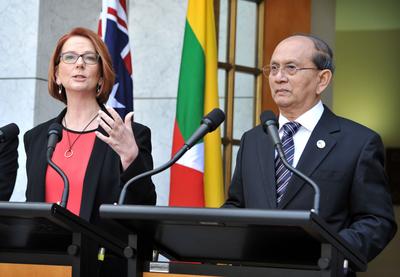The visit — the first to Australia since 1974 — allowed the Gillard government to make a number of new commitments specifically designed to support Myanmar’s reform process and the development of democratic institutions.
The visit followed a series of similar overseas trips that Thein Sein has made since assuming office. Its purpose was to reassure Australia — and the Burmese community in Australia — that his government is genuinely committed to reform. In return, Thein Sein was looking for (and received) an explicit reaffirmation of Australia’s support for these reforms. He also thanked Australia for its past support as Myanmar’s fourth-largest bilateral aid donor.
During the visit, Prime Minister Gillard announced additional Australian aid for Myanmar to create a ‘Myanmar-Australia Partnership for Reform’. This will not involve a substantial increase in aid (AU$20 million over two years, in addition to the AU$58 million that Australia has already committed for 2012–13), but it does represent a significantly new style of commitment. The partnership is targeted at helping Myanmar’s government to ‘strengthen democratic institutions, promot[e] human rights, improv[e] economic governance and advanc[e] the rule of law’. These governance-related goals signal a policy shift from Australia’s traditional emphasis on providing aid to fulfil humanitarian objectives in health, education and poverty alleviation. They also represent Australia’s first concrete commitment to President Thein Sein’s reform agenda.
Controversially, Gillard also announced that Australia will ‘support democratisation and reform’ in Myanmar by restarting its defence engagement with the state. Australia will post a defence attaché to Myanmar for the first time since 1988, and resume defence training for Myanmar soldiers in peacekeeping operations, and humanitarian and disaster relief activities. This change means that, as well as being the first country to lift economic sanctions on Myanmar, Australia is now the first to partially lift defence sanctions (the United States has always had defence attachés in Yangon). Australian restrictions on military operational cooperation and arms sales will remain in place.
Gillard also announced a series of measures to encourage the development of commercial ties between Australia and Myanmar. Australia will encourage ethical trade with, and investment in, Myanmar by Australian firms, including through the global Extractive Industries Transparency Initiative, which will hold its next global conference in Sydney in May 2013. Gillard also confirmed that Austrade will re-open an office in Myanmar in the near future. These announcements followed the launch of an Australia-Myanmar Chamber of Commerce by Australian business groups last week, just ahead of Thein Sein’s visit.
Some commentators have characterised Prime Minister Gillard’s announcements as a ‘reward’ for Thein Sein, perhaps implicitly questioning whether they were appropriate or well timed. During his visit, President Thein Sein was met by loud demonstrations protesting against ongoing human rights abuses in Myanmar and the treatment of ethnic minority groups in areas where the Myanmar army is still fighting insurgencies. These protests are a reminder that opinion on the progress of Myanmar’s reforms is not unanimous.
But few people in Myanmar would see it this way. They would likely interpret Gillard’s announcements as recognition that Myanmar needs serious help to achieve Thein Sein’s reforms, especially given the low levels of international assistance that Myanmar has received during the past 20 years of sanctions. Many of the approximately 20,000 Burmese residents in Australia are also looking for ways to contribute to Thein Sein’s reform program.
The president’s visit highlights a significant change in Australia’s policy approach to Myanmar. Australia is determined not to be a mere observer in the country that will assume the chair of ASEAN in 2014. The Gillard government is now directly supporting reform-related activities, rather than just pursuing traditional humanitarian objectives. This approach will help to embed reforms and prevent them from failing before Myanmar’s next elections in 2015.
It is vital now that Australia live up to these important new commitments to improve governance, strengthen democratic institutions, and promote human rights as Myanmar moves towards democracy. Some promises made in June 2012 by Foreign Minister Bob Carr have still not been fully honoured.
Trevor Wilson is a Visiting Fellow at the College of Asia and the Pacific, the Australian National University.


This a another good paper
Thanks